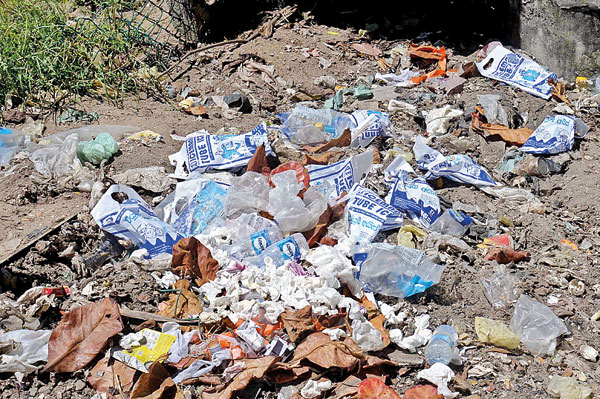News
No proper mechanism to tackle plastic waste
View(s):By Ryan Casiechetty
The absence of an effective recycling and waste management system is causing tons of plastic waste to be left behind in garbage dumps.
With the state sector playing a minor role in recycling, the issue has been aggravated with no proper plan to collect plastic items including empty bottles. Meanwhile, out of 150 composting plants, 20 are not functioning.
One reason for the difficulty in proper disposal of the waste is the high quantity of plastics used as covers for products. This requires additional work from those involved in waste management.
Product manufacturers should reduce their use of plastics in their products, Senior Lecturer at the University of Peradeniya Dr. Anurudda Karunarathna told the Sunday Times.

“The public must follow the National Action Plan on Waste Management introduced by the Ministry of Environment,” he said. “It has stages covering the entire life cycle of the plastics, starting from importation and processing to final use and disposal. This is also one of Sri Lanka’s Sustainable Development Goals. Through successful completion of this system, Sri Lanka can improve its waste management system considerably.”
Composting plants, if repaired, can easily covert much more degradable waste into compost, Dr. Karunarathna pointed out. “Non-degradable plastic wastes, which have a negative impact on the environment, are difficult to sort for recycling due to households not separating them before disposal. Overpacking of products with polythene and plastics should be minimised by the producers in the production industry.”
The Central Environmental Authority is focusing on prevention and reduction rather than recycling, said its Director General Hemantha Jayasinghe. The Government has limited involvement in recycling, as opposed to the private sector which was highly involved.
The Extended Producer Responsibility (EPR) had a role to play here, requiring the producer to be responsible for its product cycle until disposal. The environmental police assisted the CEA in raising awareness about plastics reduction among the public.
While some of the local councils collected segregated garbage, most did not. All of their waste is sent to third parties after being separated, said M. M. C. K. K. Mannapperuma, Commissioner of Dehiwala-Mt. Lavinia Municipal Council. Degradable materials and burnable items go to the Karadiyana waste management plant while meat and fish waste is sold to pig farms or other places to make animal food products.
Private organisations are engaged in recycling plastics. One of them is Eco Spindles which runs a large plastic upcycling plant. They said the process has three main tasks: collecting plastic waste and converting it into plastic flakes; manufacturing plastic products like brushes and brooms; and making products like clothes and sports jerseys out of the yarn extracted from the plastic waste.
The waste is collected from over 700 collectors islandwide who are paid for what they hand over. Apart from aiming to reduce the carbon footprint and create a greener environment, the organization conducts awareness programmes on the importance of plastic recycling and waste management.
The John Keells Group also has a project named Plastic Cycle launched in 2017 through which it supports responsible disposal, recycling and reducing the use of plastics. It also assisted some Government authorities and schools in this regard.
Meanwhile, USAID has contributed to projects such as keeping oceans and the environment clean. Funded by the US Government, it has wide-scale initiatives that focus on reducing the use of harmful virgin plastics.
The best way to say that you found the home of your dreams is by finding it on Hitad.lk. We have listings for apartments for sale or rent in Sri Lanka, no matter what locale you're looking for! Whether you live in Colombo, Galle, Kandy, Matara, Jaffna and more - we've got them all!

